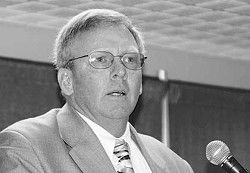Farm Bureau chief defends stand on Measure 49
Published 4:00 pm Tuesday, December 11, 2007

- <I>Photo by Elaine Stein</I><BR>Barry Bushue, president of the Oregon Farm Bureau, speaks to delegates at the annual meeting held in Pendleton.
PENDLETON – When the Oregon Farm Bureau kicked off its 75th annual meeting last week, amidst the celebrations there were expressions of frustration that the state organization supported Measure 49 in the last special election.
Executive members of the Farm Bureau acknowledged the stand on land use hurt the organization, but also defended the action.
During discussion on the budget on Dec. 4, several people said they were upset that the OFB board took a stand on Measure 49.
An exasperated Bud Combe of Josephine County said the measure “cost us millions on our ranch.” A strong majority of voters in his county had voted for Measure 37 and against Measure 49 on land-use issues.
“How many times do we have to take a damn lickin’ in the state of Oregon?” he said.
House of Delegates chairman Tracey Liskey, who is the first vice-president of the Farm Bureau, said the fuss over Measure 49 has taken a toll on membership numbers around the state, “and it’s something we have to address as a House.”
He said that the Farm Bureau board had passed support for Measure 49 on a two-thirds majority, and that the policies were based on what the majority wanted as policy.
“If the policies aren’t where you want the board to be” then you should change the policies, he told delegates.
Dave Dillon, OFB executive vice-president, offered some perspective on the challenges faced by the Farm Bureau. The organization has lost 300 voting and supporting members, he said.
“We’ve had the lowest number of county Farm Bureaus make goal this year, at nine, that we’ve had since the last big dues increase in 2001 when only eight made goal,” said Dillon.
“One county lost over 25 percent of its voting and supporting members in a single membership year … I’m sure you feel the pain at the county level as well. You feel it financially, and in participation, and in the challenges of finding new leadership to help shoulder the load,” Dillon said.
Measure 49 has posed challenges to leadership on another level: President Barry Bushue was facing competition last week in an election to keep his position.
Bushue, in his speech to the House of Delegates, defended the Farm Bureau’s decision to support the measure.
“I’m not going to apologize for our policy, I won’t apologize for it in public. I represent the policies that you put forward. I do it with pride and I do it with integrity, and I know that each one of you in this room does the exact same thing, as does your board of directors,” he said.
Bushue said there have been “subtle but substantive changes by the House of Delegates to their policy during the last three years that put the Farm Bureau board in a position to support the passage of Measure 49.”
Bushue said policies are developed in an open and transparent forum that deliberates and discusses all sides of many issues, and during the last 75 years the Farm Bureau has made decisions on controversial issues based on that.
He said he has been told that people have quit the Farm Bureau in the past because of its position on commodity commissions, water ownership and “a number of our policies, many of them controversial – maybe not as controversial as land use.”
Bushue said Measure 49 is no different that some of the other issues, although it’s been a more personal and controversial one because it might have a direct impact on the delegates.
But he stressed that Farm Bureau discussions are “the personal beliefs, issues and impacts that each of you bring to the table. The result is a policy book that reflects the commonalities of those experiences but does not mirror the positions you may individually hold.”
He emphasized that the integrity and credibility of the organizations depends on advocating policies developed by delegates. “The alternative is to merely arbitrarily pick and choose what we support based on somebody’s whim,” he said.
He said the strength the organization has is it does not allow him, other executive members, or the board make the choices on policies.
The decision on Measure 49 “wasn’t made by your board of directors” but like other policy issues was made by the delegates.
Bushue asked members to stay engaged and stay with the Farm Bureau.
“We’re more than a single-issue organization … I don’t believe that any single issue should cause you to leave your involvement in Farm Bureau,” he said.
Bushue said he sees a silver lining for agriculture in the way Oregonians voted on Measure 49.
In a speech to delegates, he said he thinks the public responded to the measure because “of a desire to recognize the value of the agricultural industry in the state.”
He said the campaign tied the “necessity of an agricultural land base as key to our industry” and the public’s support of the measure showed they support the value of the land.
In the aftermath of the election, Bushue sees opportunity.
“I think we are now in a tremendous position to take advantage that public support us. We need lots of tools to farm, lots of tools to make a living,” he said.
Bushue said that the Farm Bureau should take the public support and “leverage those people so they support us for the use of our pesticides, the value of our water, the necessity of labor, the necessity for a good immigration reform policy, grazing, public grazing, animal rights issues and all of the other elements of our Oregon Farm Bureau policy.”





